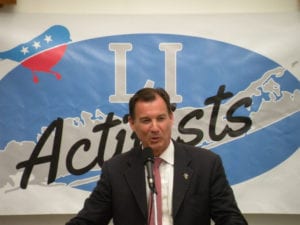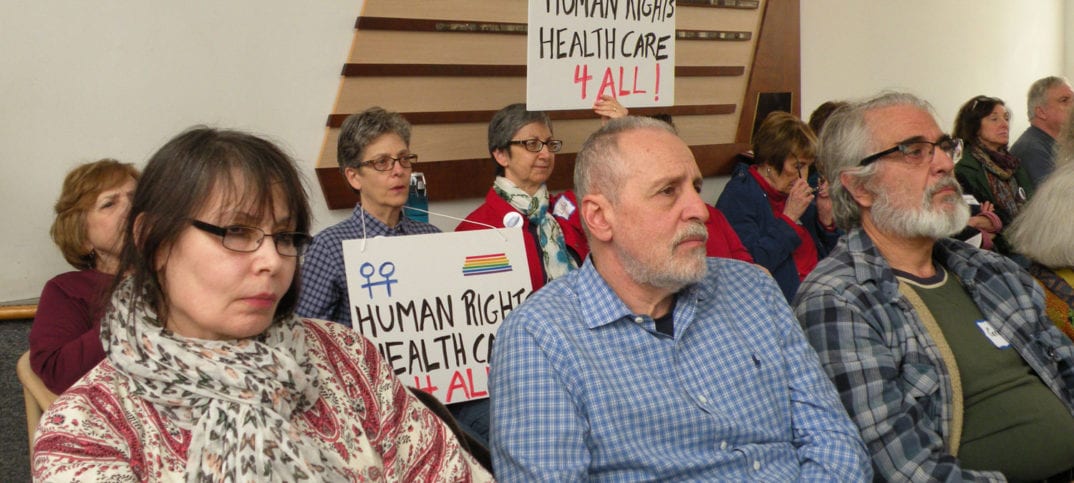With changes in health care looming thanks to the election of President Donald Trump (R), the issue took center stage in Huntington this past weekend, as more than 350 Long Island residents participated in a rally Feb. 25 to support the Affordable Care Act and advocate for a single-payer plan bill in Albany.
Organized by the group Long Island Activists with help from Our Revolution and the New York Progressive Action Network, the rally joined together residents from all nine New York State Senate districts.
Ron Widelec, a member of the LIA steering committee, said the event was intended to help educate more New Yorkers about the strengths of a Medicare for all system, as he said many misconceptions about the plan have been spread.
A single-payer or Medicare for all plan “is the only plan that actually brings us to a place where health care is a human right,” Widelec said in a phone interview. “We would see better results and it would [cost] less per person. We can cover everyone for less.”
A single-payer system requires a single-payer fund which all New Yorkers would pay into to cover health care costs of an individual, instead of through private insurers. In a single-payer system every citizen is covered, patients have the freedom to choose their own doctors and hospitals, and employers would no longer be responsible for health care costs.
The ACA established standards for health care in America when enacted in 2010, though it does not supersede state laws relating to health care.

Martha Livingston, professor and chair of the Department of Public Health at SUNY Old Westbury said a Medicare for all system would be an improvement to the current system.
“We know from experience looking everywhere else it works better and costs less,” she said in a phone interview. The World Health Organization conducted a study on American health care in 2014, and cited one of the reasons the U.S. health system has high costs and poor outcomes includes a lack of universal health care.
“No one would have to make the tough choice between the cost of an EpiPen and feeding their family,” Widelec said, referring to the increase in cost of pharmaceutical products patients can’t opt to go without. Mylan Pharmaceuticals, the drug’s maker, drove the price of EpiPen up about $500 in recent years — some six times. Turing Pharmaceuticals did the same with Daraprim, a drug used by cancer and AIDS patients — although that price tag increased to $750 a pill from $13.50.
The Journal of the American Medical Association has confirmed the U.S. faces this trend of large increases in drug prices, more so than any other countries.
“Per capita prescription drug spending in the United States exceeds that in all other countries, largely driven by brand-name drug prices that have been increasing in recent years at rates far beyond the consumer price index,” the study said.
Livingston agreed the current system is flawed.
“Really what we want is fairness,” she said. “We’re the only country that doesn’t negotiate with insurance companies. We need to get rid of the profiteers standing between us and [health care].”
Aside from informing Long Islanders about the benefits of a Medicare for all system, the rally also focused on creating a game plan to help grow support for the New York Health Act, a bill passed in the 2015-16 New York State Assembly session but not in the New York State Senate.
The Assembly bill for the 2017-18 session, which is currently in committee, establishes the New York Health program, a single-payer health care system.
“The Legislature finds … all residents of the state have the right to health care,” the bill states. It acknowledges ACA helped bring improvements in health care and coverage to New Yorkers, however there are still many left without coverage. The legislation explicitly labels itself as a universal health plan with the intention to improve and create coverage for residents who are currently unable to afford the care they need.
“No one would have to make the tough choice between the cost of an EpiPen and feeding their family.” — Ron Widelec
If New York passed the law, residents would no longer have to pay premiums or co-pays, employers would not have to be responsible to provide health care — which currently costs business more than $1 billion annually, and all patients would be covered and could chose whatever doctor or hospital they wanted.
According to a new study by Gerald Friedman, chair of the University of Massachusetts at Amherst Economics Department, the cost of New York Health Act would be $45 billion less than what New York currently spends.
“Individuals often find that they are deprived of affordable care and choice because of decisions by health plans guided by the plan’s economic needs rather than their health care needs,” the bill states.
The New York Health Act is also in committee in the state Senate, where it has significantly less support.
“We want to flip some state Senate seats,” Widelec said. Participants also broke up into their state Senate districts to discuss plans of action to garner support for the bill in each area and put pressure on their elected leader at the end of the rally.
Steve Cecchini, a rally participant, said many people are clearly in support of the bill.
“The only thing I learned was a lot of people were excited to hear about the New York Health Act,” he said in a phone interview. “One of the goals was to get people the tools they need to understand the act and talk about it. It’s really about getting enough support from the constituents. It’s ridiculous what we’re not getting and what we’re overpaying for right now.”
Widelec said there is a lot of misinformation about what a single-payer plan is, as many approach it as a socialist concept. But he affirmed the current system in not working and needs to be improved. According to the World Health Organization, the U.S. trailed more than 30 countries in life expectancy in 2015, and in a 2000 report by WHO, America was ranked 37 out of 191 countries for health care performance.
“It’s really exciting to see people inspired and activated,” Livingston said. “It’s looking to me like Long Islanders are eager to make a difference.”
The 3rd Congressional District U.S. Rep. Tom Suozzi (D-Glen Cove) spoke at the rally, after meeting with the Long Island Activists group in January and signing a pledge to sponsor a single-payer bill if the Democratic Party retakes control of the Congress. He has said until that time he will continue to defend the ACA.







